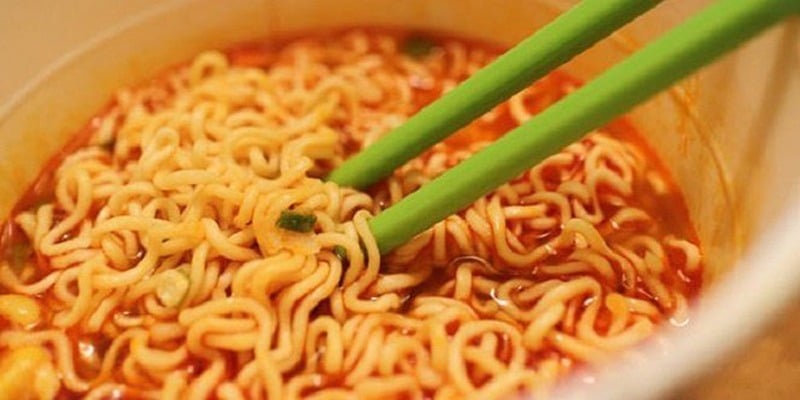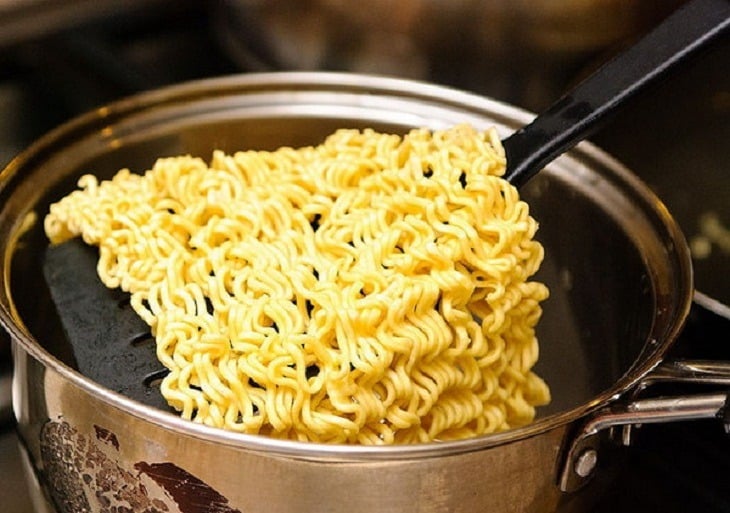Instant noodles, dried noodles, or ramen are staple meals for many households, especially for elderly individuals living alone who prefer quick and simple cooking. A bowl of noodles with some vegetables and an egg can make for a fast and easy meal. However, this convenience comes with hidden health risks.
Recently, a 61-year-old woman was rushed to the hospital with severe stomach cramps after eating noodles, according to Sohu. Doctors revealed that this is not an isolated case, often stemming from a common yet harmful cooking habit.

Noodle Broth: Deceptively Harmful
Many believe noodles are light and easy to digest. Yet, numerous patients with stomach issues face complications due to improper noodle consumption.
Most people boil water, add noodles, and cook until tender, then toss in vegetables and seasonings, consuming both noodles and broth. This quick method skips a crucial step: rinsing the noodles and changing the water.
During cooking, excess starch, residue, and additives dissolve into the water, making it cloudy and viscous. Instant or dried noodles often contain anti-caking agents, texture enhancers, and preservatives, which further contaminate the broth. Drinking this mixture exposes the stomach to far more harm than commonly assumed.
Elderly Individuals at Higher Risk
Seniors typically have weaker digestive systems, reduced stomach acid production, and sensitive stomach linings. Regularly consuming noodles with broth can irritate the stomach lining, leading to burning sensations, bloating, and severe cramps. Some may experience nausea, requiring intravenous fluids for stabilization.
Adding seasoning packets or oil further exacerbates the issue. A single seasoning packet can contain over 1,500mg of sodium, nearly 4g of salt. Combined with sodium from other meals, this can far exceed daily recommendations, increasing the risk of stomach ulcers, acid reflux, and worsening existing stomach conditions.
Additionally, the soluble starch in the broth causes rapid blood sugar spikes. For those with diabetes or insulin resistance, this poses a significant risk, placing additional strain on the stomach and digestive system.

Healthy Noodle Consumption Tips
Nutrition experts recommend the following guidelines for safer noodle consumption:
Rinse and Change Water: Once noodles are 7–8 parts cooked, remove them, rinse with hot water, or transfer to a fresh pot. This eliminates excess starch and impurities, making the noodles lighter and more palatable.
Choose Fresh Ingredients: Avoid processed meats like sausages or canned foods, which contain nitrites and preservatives. Opt for fresh vegetables, mushrooms, eggs, or tofu for a balanced and digestible meal.
Eat Slowly and Chew Thoroughly: Seniors, in particular, should avoid eating while distracted or rushing. Proper chewing stimulates adequate stomach acid production, easing digestion.
Moderate Portions: Avoid overeating noodles, especially on an empty stomach in the morning.
Don’t Let Convenience Harm Your Stomach
After age 60, stomach function declines rapidly, and many seniors take medications for blood pressure, cholesterol, or heart conditions, which can further irritate the stomach lining. Unhealthy eating habits can trigger stomach issues, significantly impacting quality of life.
Changing the water while cooking noodles takes only a few extra minutes but can prevent numerous digestive problems. As doctors emphasize, “A fresh pot of water is a small effort that can spare you from unnecessary abdominal pain and hospital visits.”
































